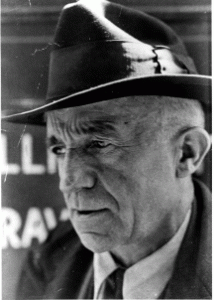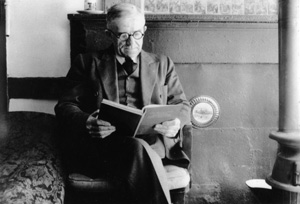The Peter Maurin Conference was, from the beginning, a labor of love. A group of 12 gathered over Zoom in early 2023 to discuss plans for a Peter Maurin conference in Chicago. Why Chicago, for a conference dedicated to a man born in France, who became famous in Union Square, and was buried in New York City?
Peter told Dorothy Day that, for many years, he did not live as a Catholic should. But after a decade of living in Chicago, Peter left for Mount Tremper, New York. There, he began practicing voluntary poverty and formulating the keen social analysis that would become his “Easy Essays.” Although the “hidden years” of Peter Maurin’s wanderings across North America are hard to unravel, it seems likely that it was during Peter’s life as a French teacher in Chicago that he experienced some kind of deeper conversion back to “living as a Catholic should.”
A century after Peter moved to Chicago, the Peter Maurin Conference began to take root. In the spring of 2017, The Catholic Worker noted both a lack of Peter Maurin in the daily life at Maryhouse in New York City and a renewed interest in Peter Maurin.
“Peter Maurin, co-founder of the Catholic Worker movement, seems more out of the picture in our everyday lives here,” a correspondent from Maryhouse wrote in The Catholic Worker in June 2017. “[Dorothy Day] is more, you could say, ‘in the news.’”
But the correspondent points to a small Peter Maurin renaissance bubbling: a front-page article by James Murphy, then at St. Joseph Catholic Worker in Rochester, about his trip to Peter Maurin’s homeland, and a subsequent Friday Night Meeting held about James’ experiences in France, meeting Peter Maurin’s surviving relatives. The Maryhouse writer even describes a small impromptu celebration for Peter’s death anniversary on May 15, following a donation of pies.
Seven years later, James was one of the organizers for the Peter Maurin Conference held September 6-8, 2024, at St. Gregory’s Hall, part of Mary, Mother of God Parish on Chicago’s north side.
One of the key takeaways from that Zoom call a year before was that a scholarly investigation of Peter’s life, his thought and sources, and his program in the world today should be free of the trappings of an academic conference– “the country club vibes”–as one advisor called them. A gathering to celebrate the thought of a scholar who was once mistaken for a homeless bum ought to eschew catered canapés or tweedy happy hours.
The Peter Maurin Conference was a scholarly conference—organized in cooperation with Loyola University Chicago’s Hank Center for the Catholic Intellectual Heritage and DePaul University’s Catholic Studies Department—but it was not an academic conference.
The Peter Maurin Conference was held at a parish to represent Peter’s call to the Catholic Church to “blow the dynamite” of Catholic Social Teaching. The vision Peter laid out in his program was a program for Catholic communities, including parishes. Many of Peter Maurin’s original pleas for the Green Revolution, hospitality and the reconstruction of the social order were directed at parishes, dioceses, priests, and bishops. According to the Second Vatican Council, the laity have a vocation to “seek the kingdom of God by engaging in temporal affairs and by ordering them according to the plan of God” (Lumen Gentium §31). “The laity consecrate the world itself to God” (LG §34). The conference wanted to bring Catholic action back to the very parish communities who are responsible for Catholic action.
The conference took place in the basement of St. Gregory the Great’s parish gymnasium, with an antique electric Bingo sign still hanging on the wall, chairs dating from the Baby Boom, and a decor reminiscent of the mid-century. It was easy to imagine Peter Maurin’s Easy Essays first recited in a hall just like this one.
More than 100 attendees—from California to France, some veterans and some novices in houses of hospitality, some curious about Dorothy Day and her teacher, some experts, many young, some old, and all yearning for a way to make a society where it is easier to be good—came to learn more about Peter Maurin and discuss his vision, his sources, and its practical application to the problems of the world today.
The conference began, of course, with concocting a giant pot of soup. Emily and Spencer Hess and their compatriots from Maurin Academy were the chefs de cuisine, and they led a line of sous chefs that gave lie to the proverbial wisdom that there can ever be too many cooks in one kitchen. The volunteer kitchen staff featured rotating volunteers, included Stefan Gigacz of the Australian Cardijn Institute, Tommy Cornell of Peter Maurin Farm in Marlborough, New York, Matthieu Langlois of Fordham University, and other conference-goers—including two of the youngest attendees from St. Peter Claver Catholic Worker in South Bend, IN—who walked into the kitchen and offered to slice, stir, season and serve.
After dinner, Jon Sozek of Albertus Magnus College in New Haven, Connecticut gave his keynote: a clarification of thought on “personalism in the streets.” Sozek distinguished Peter’s personalism from both the personalism of Emmanuel Mounier in France and the Polish branch that bore fruit in Pope John Paul II. The personalism of Peter Maurin, lived in community, put in action through Catholic Social Action, he said incarnates Pope Francis’ call to encounter. He called it, “lightning bolt personalism.” Personalism is so hard to define, Sozek said, because it is about encounter, about leaving room for the Spirit to move between oneself and one’s neighbor.
Lincoln Rice of Marquette University gave the second keynote Saturday morning, guiding participants at the conference through Peter’s first year of Easy Essays published in The Catholic Worker newspaper. After breakfast and Lincoln’s talk, participants split into three roundtable discussions, one on Peter’s influences: Jean-Baptiste de la Salle and the Christian Brothers and Marc Sanguier and Le Sillon. Another on Maritain and Berdyaev, key influences of Peter Maurin’s ideas. A third discussed protest, resistance, and the role of the Christian in history, and was led by a veteran of the movement and one of the newest Catholic Workers. Brian Terrell, of Strangers and Guests Catholic Worker Farm in Maloy, Iowa dialogued with Jeromiah Taylor, who just began Vulnera Christi Catholic Worker in Wichita, Kansas, last year.
In the afternoon, another three concurrent Roundtable Discussions were held, one on voluntary poverty, another on Peter Maurin’s agronomic university and his economic vision, and a third featured Harry Murray, professor emeritus of sociology at Nazareth College. Murray spoke about a prolific writing project Peter Maurin embarked upon: “arrangements” or free-verse summaries of different theological, sociological, and philosophical texts. Visitors to the Catholic Worker archives at Marquette University will see folders upon folders of these arrangements in boxes of Peter Maurin’s papers. They are a rich educational resource Maurin created, waiting to be tapped.
Participants from the various roundtable discussions remarked on the unique tone of the conference. The roundtables were scholarly, revolving around the discussion of ideas–some more technical and precise than others–but the discussions were free-flowing. Voices from every walk of life had a chance to chime in, and the discussions were markedly inter-generational in their composition. White-haired elders dialogued with recent college graduates. Previous generations of Catholic Workers chatted with youngsters. Folks who had experienced or were experiencing homelessness broke bread with bishops and judges. The dynamite was being blown.
On Saturday evening, we shared Easy Essays of Peter’s and of our own creation, original poetry, and reflections on the conference. It was an evening of laughter and joy. One poignant moment was when our friend Tracy, a core member at the parish’s post-Soup Kitchen Bible Study on Tuesday nights, read Peter Maurin’s Easy Essay, “Houses of Hospitality”:
“We need Houses of Hospitality
to give to the rich
the opportunity
to serve the poor.
We need Houses of Hospitality
to bring the scholars
to the workers
or the workers
to the scholars.
We need Houses of Hospitality
to bring back to institutions
the technique to institutions.
We need Houses of Hospitality
to show
what idealism looks like
when it is practiced.”
When I asked her why she chose that Easy Essay, Tracy said, “Because it’s important. We need hospitality.”
Throughout the weekend, the conference sold copies of our friend Colin Miller’s book, We are Only Saved Together (Ave Maria Press). Colin’s book describes, so clearly, what Dorothy and Peter were trying to inspire in their readers: the social connotations of the doctrine of the Mystical Body of Christ, a love for the poor, and an emphasis on a community that welcomes others. In following this creative plan for a Christian community, Colin finds that they created “a people where there once was no people.”
That, in a nutshell, was my experience of the conference. At the beginning of the weekend, we were individuals coming together for an event. By the end, united in communal prayer and the sharing of food, thought and life with one another, we were newly united in a “common unity of community”–and our mission to reconstruct the social order.
Renée Roden was one of the organizers of the Peter Maurin Conference. She is from Minnesota and met the Catholic Worker movement in New York City. She now lives at the St. Martin de Porres Catholic Worker in Harrisburg, Pennsylvania.
Houston Catholic Worker, October-December 2024, Vol. XLIV, No. 4



